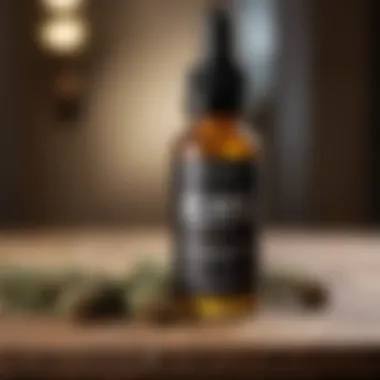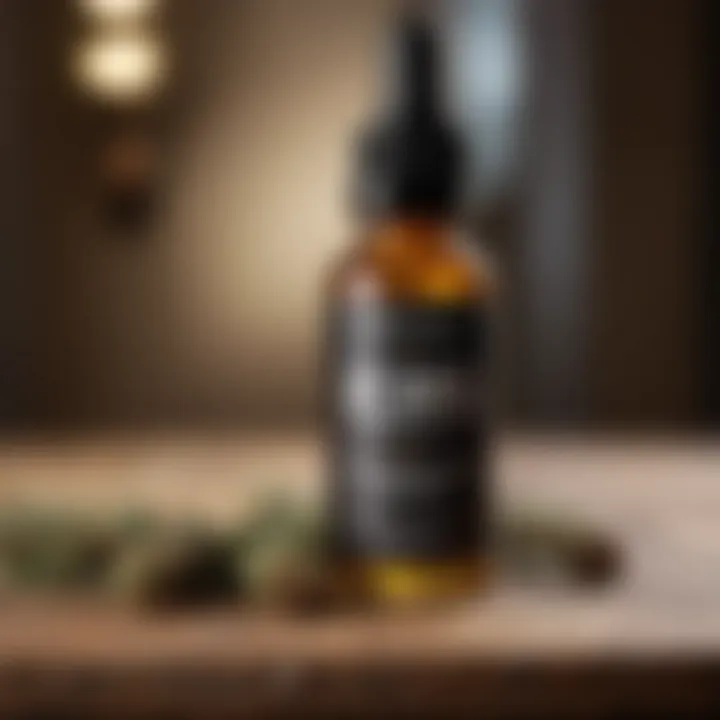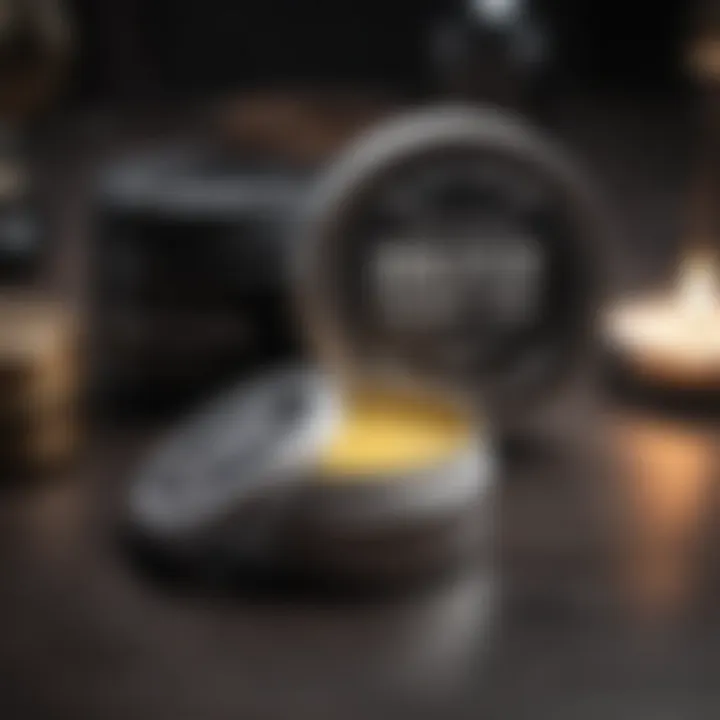Techniques to Soften Your Beard for Comfort and Style


Intro
Making your beard softer does not merely revolve around aesthetics; it affects comfort and overall grooming experience. A soft beard can prevent itchiness and irritation, enhancing your daily routine. This article aims to provide comprehensive insights into beard care, focusing on various techniques and products available. We will analyze grooming routines, dietary influences, and the necessity of selecting the correct tools and products.
Grooming Techniques
When it comes to beard care, establishing a solid grooming routine is vital. Key elements include regular washing, conditioning, and trimming.
- Washing: Use a dedicated beard wash, which is different from regular shampoo. A good beard wash removes dirt and excess oil without stripping essential moisture. Consider products containing natural oils like argan or jojoba to maintain hydration.
- Conditioning: Conditioning your beard is crucial. After washing, apply a quality beard conditioner. This step will help to soften the beard hair and make it more manageable.
- Trimming: Regular trims can remove split ends and keep your beard looking sharp. Even if you're growing it long, maintenance will ensure that the hair remains healthy and appears softer.
Nutrition for Beard Health
Diet plays an essential role in the softness of your beard. What you eat impacts hair quality. Here are some nutritional tips:
- Hydration: Drink plenty of water. Hydrated hair is less brittle and more likely to feel soft.
- Protein: Hair is made mostly of protein. Incorporating lean meats, eggs, and legumes can improve beard growth.
- Vitamins and Minerals: Vitamins A, C, E, and B vitamins, along with minerals like zinc and iron, contribute to hair health. Consider a balanced diet or supplements if needed.
Home Remedies
Several home remedies can significantly improve the softness of your beard.
- Coconut Oil: A natural conditioner. Simply warm a small amount and massage it into your beard. Leave it on for at least 30 minutes before washing.
- Olive Oil: Similar to coconut oil, olive oil provides hydration. Rub it into your beard for softness and sheen.
- Aloe Vera Gel: Known for its soothing properties, aloe vera is great for conditioning the hair and keeping the skin underneath nourished.
Choosing the Right Tools
Selecting the appropriate grooming tools is another aspect of beard care.
- Beard Brush: A good beard brush helps distribute natural oils and can promote better growth.
- Beard Comb: Using a comb can detangle and style your beard without causing damage.
- Scissors or Beard Trimmer: Invest in high-quality trimming tools for regular maintenance. It is important to keep your beard healthy and well-groomed.
"Regularly caring for your beard is resembling nurturing a plant. It needs the right care to flourish."
Culmination
In summary, making your beard softer is achievable through a combination of proper grooming techniques, mindful nutrition, effective home remedies, and the right tools. By integrating these elements into your routine, you can enjoy a comfortable and stylish beard that enhances your overall appearance.
Understanding Beard Texture and Growth
Understanding the nature of beard texture and growth is crucial for any man aiming to achieve a soft and well-groomed beard. This section delves into the characteristics of facial hair and the various factors that contribute to its softness. Through this understanding, one can make informed decisions about grooming routines, product selection, and overall beard care strategies.
The Nature of Facial Hair
Facial hair has unique properties that differentiate it from scalp hair. The structure of beard hair is generally coarser and thicker than that of regular hair. This textural difference can influence how a beard feels and looks. The type of beard one has varies because of individual genetic traits, which play a significant role in determining overall hair texture. Depending on genetics, some men may experience a soft beard while others may have a wiry or rough one.
Moreover, beard hair often grows in different patterns and directions, affecting how it can be styled and maintained. Recognizing these characteristics is the first step toward effective beard care.
Factors Influencing Beard Softness
Multiple elements can affect the softness of a beard. The interplay of genetics, age, and hormonal levels contributes to how soft or coarse facial hair can be.
Genetics
Genetics is the most significant factor influencing beard softness. The thickness, coarseness, and overall texture of a beard largely come from one’s genetic makeup. There is a wide spectrum; while some men are blessed with soft and manageable beards, others may struggle with rough, thick growth. Heredity determines the shape and growth rate of facial hair as well. For instance, individuals from different ethnic backgrounds often exhibit distinct beard characteristics. Understanding the role of genetics can help set realistic expectations for beard care and softness.
Age
Age affects beard softness, too. As men grow older, their hormonal levels change, which can impact hair texture. Younger men may notice their beards are softer initially; however, with age, hair can become coarser due to changes in the body's hormone production. Environmental factors, like exposure to sun or pollutants over time, can also impact beard texture. Older men might need to dedicate more time and effort into softening their beards through proper care.
Hormonal Levels
Hormones play a critical role in beard development and texture. Testosterone, for example, is known to affect the growth and quality of hair. Elevated levels of testosterone can result in thicker and potentially coarser hair. Conversely, lower hormone levels may lead to softer but sparser growth. Maintaining balanced hormonal levels can be crucial for those wishing to regulate the texture of their facial hair better.
Understanding these factors helps in creating a tailored approach to beard care. By recognizing how genetics, age, and hormones intertwine, one can select appropriate grooming techniques and products to achieve a softer beard.


Common Myths About Beard Softness
Understanding common myths surrounding beard softness is crucial for those committed to cultivating their facial hair. These misconceptions can lead to ineffective practices that do not yield the desired results. Addressing these myths provides clarity and encourages a more informed approach to beard care.
Debunking Popular Misconceptions
Many men hold onto misconceptions about what contributes to a soft beard. One common myth is that only specific types of beard products, such as oils or conditioners, can soften facial hair effectively. While these products indeed play a significant role, they are not the sole factor in achieving beard softness. Proper hygiene, regular grooming, and a good diet also greatly influence beard texture.
Another prevalent misconception is that trimming a beard makes it softer. Trimming does help in managing split ends, which can give an illusion of softness, but it does not directly affect the hair's texture. Softness comes from hydration and care practices rather than merely cutting hair.
Additionally, many believe that beards grow coarse with age. While hormonal changes and genetics do impact hair texture over time, age alone does not dictate the softness of a beard. Various options, including proper conditioning and nutrition, can help maintain or improve softness as one ages.
Understanding Beard Care Products
Choosing the right products for beard care is essential for anyone seeking a softer beard. Not all products are created equal; understanding their ingredients and how they function can lead to better decisions.
Beard oils are often made from natural oils, like jojoba or argan oil. These oils help hydrate and condition both the hair and the skin underneath, reducing dryness and making the beard feel softer. It is best to select oils without synthetic fragrances or harsh chemicals to protect the natural integrity of the hair.
Conditioners and balms also serve important roles. Balms typically have a thicker consistency, providing a protective layer over the beard, which helps in retaining moisture. Conditioners can penetrate the hair shaft, offering deeper hydration. It is vital to distinguish between these products and their functions to utilize them effectively in a grooming routine.
Understanding the importance of beard shampoos is also crucial. Unlike regular shampoos that may strip facial hair of essential oils, beard shampoos are formulated specifically for facial hair needs. They often include ingredients that cleanse while still nourishing, contributing to hair softness without causing damage.
Importance of Proper Beard Care
Proper beard care is not merely about aesthetics; it directly influences comfort, hygiene, and skin health. Without appropriate maintenance, beards can become coarse, unruly, and even a breeding ground for bacteria. Regular grooming helps to keep facial hair soft and manageable. Moreover, it promotes healthy growth and prevents issues like itchiness or irritation.
Investing time in a daily and weekly beard care routine leads to more than just a pleasant appearance. With a little effort, a softer beard can enhance your overall confidence and presence. This routine serves as a form of self-care that many men may overlook.
Daily Grooming Routine
A daily grooming routine is essential for maintaining beard softness and appearance. It should be simple yet effective. Begin by washing your beard with a gentle cleanser designed for facial hair. Use warm water to open the pores and help cleanse the skin underneath. After washing, apply beard oil or conditioner to soften the hair. This provides necessary hydration and helps with styling.
Brushing your beard daily is also beneficial. It distributes the natural oils and products throughout the hair, creating a uniform texture. A boar bristle brush is often recommended for this purpose, as it encourages healthy shine and reduces static. Introducing these steps into your day can dramatically improve the quality of your beard over time.
Weekly Maintenance Strategies
Weekly maintenance is crucial for sustaining a soft, healthy beard. Consider scheduling a trim every few weeks to remove split ends and keep an even length. Trimming doesn’t only shape the beard; it promotes growth by eliminating damaged portions of the hair.
Additionally, it is wise to perform a deep conditioning treatment once a week. This can involve applying a heavier oil or a specialized beard mask to nourish the hair and the skin beneath. Let it sit for a period before rinsing it out, allowing the ingredients to penetrate deeply.
Integrating these maintenance strategies into your routine ensures that your beard remains soft and well-groomed. It demonstrates to others that you take pride in your appearance, enhancing both style and comfort.
Essential Products for Softening Beards
The role of essential products in achieving a softer beard cannot be overstated. These products are not merely accessories in your grooming routine but rather crucial tools that facilitate the maintenance and health of facial hair. The right items can drastically improve the texture of your beard, making it more manageable and pleasant to the touch. Whether you have a short stubble or a longer mane, understanding these products can elevate your grooming game.
Choosing proper products involves evaluating individual needs, observing how your beard reacts to different formulations, and realizing that consistency is vital. Integration of these items into your daily or weekly grooming regime ensures that the beard remains healthy and vibrant. Since we know quality is paramount, focusing on brands that prioritize natural ingredients can be an added advantage.
Beard Oils: Function and Benefits
Beard oils serve as a cornerstone in any effective beard care routine. They typically contain a blend of carrier and essential oils that moisturize both the hair and the underlying skin. The primary function of these oils is to hydrate and tame frizzy hair, which directly contributes to softness. Coconut oil, for example, is well-known for its penetrating properties, allowing it to deeply nourish the hair strands.
Using beard oil is straightforward; a few drops are sufficient for most men. Simply rub it between your palms and then work it through your beard, ensuring even distribution. Over time, users notice not just a softer beard but also a reduction in itchiness, dandruff, and overall irritation. Additionally, many oils have enticing scents; thus, they serve a dual purpose by adding a layer of fragrance to your grooming.
Balms and Conditioners: Key Comparisons
Beard balms and conditioners undoubtedly share a common goal of softening facial hair. However, their applications and benefits can differ significantly. Beard balms, which usually contain beeswax, provide hold in addition to moisture. This feature makes balms particularly useful for men who prefer to shape or style their beards. By using a balm, you can keep stray hairs in check while also maintaining hydration.
In contrast, conditioners focus primarily on softening. They are designed to be applied less often—typically after washing the beard—to provide intense moisture without adding heaviness. Both products can coexist within a grooming routine, with the balm acting as a styling product and the conditioner focusing on deep nourishment.
Shampoos and Cleansers: What to Look For
Not all shampoos and cleansers are created equal, especially when caring for facial hair. Regular hair shampoos can strip the natural oils from the beard, leading to roughness and dryness. Therefore, selecting a specialized beard shampoo is advisable. Look for products free from sulfates and parabens, as these harmful chemicals can diminish the natural sheen and softness of beard hair.


When evaluating shampoos, consider formulas that include moisturizing ingredients such as aloe vera or glycerin. These substances will help keep the beard hydrated. A common practice is to wash the beard a few times a week, depending on personal lifestyle and activity levels.
"Choosing the right products makes all the diference in how your beard feels and looks. A softer beard is not only attractive but also promotes confidence."
Utilizing these essential products effectively can dramatically influence the softness and overall health of your beard. By selecting the right beard oils, balms, conditioners, and shampoos, you provide your facial hair with not only immediate benefits but also long-term care.
DIY Remedies for Beard Softening
In the quest for a softer beard, many individuals turn to do-it-yourself (DIY) remedies. This section highlights the significance of utilizing homemade treatments that can enhance beard softness naturally. One of the advantages of DIY remedies is the ability to tailor ingredients according to personal skin and hair needs. Also, these remedies are often cost-effective and free from harsh chemicals found in some commercial products.
However, it is essential to consider the quality and source of the ingredients used. Natural oils and homemade masks provide a unique approach to beard care, and understanding how to use them effectively can lead to noticeable improvements in softness and overall health.
Natural Oils: An Overview
Natural oils are the cornerstone of many DIY remedies for beard softening. They supply essential nutrients that nourish the hair follicles and promote smoother, healthier beard growth.
Coconut Oil
Coconut oil is favored for its deep moisturizing properties. It penetrates the hair shaft, reducing protein loss and strengthening the beard. One key characteristic is its high-fat content which helps to lock in moisture.
Moreover, its antibacterial and antifungal properties contribute to a healthy beard environment. However, it is crucial to use virgin coconut oil to reap the maximum benefits, as refined versions may lack vital nutrients. A potential disadvantage is that some individuals may find it heavy, leading to a greasy feeling if not used in moderation.
Argan Oil
Argan oil is often touted as 'liquid gold' for its incredible texture and benefits. It is rich in vitamin E and fatty acids, making it an excellent choice for nourishing the beard and skin beneath. The lightweight nature of argan oil allows it to absorb quickly, making it ideal for daily use without leaving a heavy residue.
Its unique feature is that it also helps in taming frizz and enhancing natural shine. A possible downside is its cost, which can be higher than other oils, making it less accessible for some individuals.
Homemade Masks and Treatments
Creating homemade masks is another efficient method for softening beards. Simple ingredients available in most kitchens can be combined to form effective treatments. For instance, a mixture of honey and yogurt can provide intense hydration and nourishment. Honey’s humectant properties draw moisture into the hair while yogurt contains proteins that strengthen it.
Additionally, regular application of such masks can lead to notable improvements in beard texture. Consistency is key; making these masks a weekly habit can enhance results significantly.
In summary, DIY remedies like natural oils and homemade masks offer valuable options for men seeking a softer beard. They allow for customization, ensuring that you can find the right combination of ingredients that work best in your unique circumstances.
Dietary Considerations for Beard Care
A well-maintained beard is not just a product of external grooming techniques. Internal factors play an equally crucial role, especially diet. The food you consume has a direct impact on the texture and health of your facial hair. Nutrients obtained from a balanced diet contribute to beard softness, strength, and overall appearance. Therefore, understanding key dietary considerations can lead to a noticeable improvement in beard quality.
Nutrients That Promote Softness
Vitamins
Vitamins are essential for healthy hair growth, including facial hair. They contribute to the nourishment of hair follicles, enhancing overall hair health. Biotin, for example, supports the keratin infrastructure, which is crucial for maintaining beard strength and softness. A deficiency in vitamins can result in brittle hair that is coarse and difficult to manage.
Furthermore, Vitamin E improves blood circulation to the scalp, promoting better hair growth. Its antioxidant properties also help in reducing oxidative stress on hair, which can damage follicles. Therefore, incorporating vitamins into your diet proves to be beneficial for fostering a softer beard.
Minerals
Minerals also play an important role in beard health. Zinc is known for its ability to promote tissue growth and repair, vital for maintaining a lush, healthy beard. Additionally, Iron is crucial for proper blood circulation, ensuring that hair follicles receive adequate oxygen and nutrients. This directly impacts the luster and softness of the beard. Regular intake of minerals can contribute to maintaining a strong and manageable beard over time, making them a popular choice for men who take beard care seriously.
Hydration
Hydration cannot be overstated when discussing beard care. Water acts as a natural hydrator for all body functions, including hair health. Dehydration can lead to dry, frizzy facial hair, which is often mistaken for coarseness. Adequate hydration helps to keep hair follicles healthy and ensures elasticity, allowing for a softer beard texture. By prioritizing hydration, one can maintain the moisture level needed for softer and smoother facial hair.
Foods to Incorporate in Your Diet
To support beard softness, certain foods stand out for their nutrient-rich profiles. Incorporating these foods can lead to better results in beard quality:
- Eggs: Rich in protein and biotin, which are essential for hair growth.
- Nuts and seeds: Such as walnuts and flaxseed, packed with omega-3 fatty acids, promoting healthy hair follicles.
- Leafy greens: Spinach and kale provide vitamins A and C, contributing to sebum production, which naturally conditions hair.
- Fish: Fatty fish like salmon can boost hydration and overall hair health due to high omega-3 fatty acid content.
- Berries: They are rich in antioxidants, essential for protecting hair follicles from damage.


Maintaining a balanced diet supplemented with these nutrient-dense foods can provide significant improvements in beard softness and health.
Techniques to Enhance Beard Softness
Beard softness is an important goal for many men who value both comfort and style in their grooming habits. Softening your beard requires more than just the right products; it involves a thorough understanding of techniques that promote a manageable and pleasant texture. In this section, we will discuss practical methods that help in achieving softer facial hair, emphasizing the benefits and essential considerations.
Brushing and Combing: Best Practices
Brushing and combing are fundamental techniques in enhancing beard softness. They are crucial for several reasons. Firstly, they help in detangling knots, making the beard easier to manage. This action also stimulates blood flow to the hair follicles, which can promote healthy growth.
To effectively brush or comb your beard, consider the following best practices:
- Choose the right tools: A wide-tooth comb is perfect for untangling without causing damage. For daily grooming, a boar bristle brush works well. Its natural fibers distribute oils evenly through the beard, enhancing softness.
- Technique matters: Always start from the tips and gradually work your way to the roots. This way, you minimize breakage while also ensuring you maintain style. Use gentle strokes, avoiding harsh pulling.
- Frequency is key: Regular brushing or combing, ideally daily, will ensure your beard remains well-maintained and soft. Not only does it help in styling, but it enhances overall appearance.
"A consistent grooming routine leads to noticeable improvements in beard softness."
By adhering to these practices, individuals can cultivate a beard that is not only softer but also looks well-kept and attractive.
Trimming and Shaping for Softness
While brushing and combing lay the groundwork for softening your beard, trimming and shaping are equally critical aspects to consider. A well-shaped beard not only looks refined but can also feel softer due to the removal of split ends and uneven edges.
Here are key points to consider when trimming your beard:
- Know when to trim: Regular maintenance prevents the beard from becoming unruly. This doesn't mean trimming it all the time. Instead, assess your beard every few weeks.
- Use sharp tools: Invest in a high-quality trimmer or scissors. Dull tools can cause split ends, hampering your softness goals.
- Shaping techniques: When shaping, focus on your face shape and desired style. Pointed beards may feel coarser than rounded ones. Experiment with lengths to find what complements your facial structure best.
In saving attention to both brushing and trimming, an individual can enhance not only the softness but also the aesthetic appeal of their beard. This dual approach can result in a grooming routine that reflects attention to detail and style consciousness.
Consulting Professionals
Engaging with professionals in beard grooming can elevate your beard care routine. The expertise they provide is invaluable, especially for those who are serious about their facial hair. Under expert guidance, you can avoid common pitfalls that arise from using incorrect products or techniques. For instance, professionals can help tailor a grooming regimen that is best suited to your hair type and desired style.
Additionally, professionals offer insights that extend beyond surface-level care. They can identify underlying issues, such as skin conditions or improper maintenance practices, that may hinder your journey to a softer beard. Moreover, they can guide you towards selecting products that contain beneficial ingredients, rather than those laden with harsh chemicals.
When to Seek Expert Advice
Consulting a grooming specialist becomes essential when you notice persistent problems with your beard. These problems may include excessive itchiness, patchiness, or a lack of growth. If you find that over-the-counter solutions fail to deliver desired results, professional guidance becomes crucial. A specialist will evaluate your specific situation and could recommend personalized products or treatments that you might not encounter in standard grooming advice.
Seeking expert advice is also advisable when trying new styles. If you're considering a significant change in your beard's length or shape, a professional can offer advice on what will suit your face shape and hair type. This helps in achieving the best outcome, rather than risking disappointment due to a poorly executed home attempt.
Choosing the Right Beard Grooming Specialist
Choosing the right specialist requires careful consideration. Start by looking for professionals with a strong background in men's grooming. Checking their qualifications and past work can provide insights into their expertise. Additionally, reviews and testimonials from previous clients can give you a sense of their proficiency in beard care.
Another aspect to consider is their approach to beard health. A good specialist should prioritize quality products and methods over trends and fads. Engage with them in conversation about their recommended products and techniques for softening beard hair. Ask questions about their experiences with various grooming brands. Inquire about their understanding of different hair types and what specific strategies they employ to enhance beard softness.
Final Thoughts on Beard Softening
As we conclude this detailed exploration of beard softness, it is vital to recognize the various dimensions that contribute to maintaining a soft and manageable beard. Softening your beard is not merely a matter of choosing the right product or following a specific routine; it encompasses a broader understanding of your unique hair type, growth patterns, and individual lifestyle. The strategies provided throughout this article aim to equip readers with the knowledge needed to create a tailored beard care regimen that enhances both appearance and comfort.
Strategies like regular grooming and the use of suitable oils or balms reflect not only on personal hygiene but also on self-care. This self-care aspect connects to how one feels about themselves, reinforcing that a soft beard can elevate one's overall confidence and style. Many might overlook the psychological benefits of grooming, but a well-maintained beard can offer a sense of pride and personal expression, contributing to one’s identity.
Moreover, consistently incorporating healthy dietary choices plays a significant role in improving the overall softness of facial hair. The nutrients obtained from a balanced diet not only enhance facial hair but also contribute to skin health. Thus, this multifaceted approach underlines the importance of combining product use, grooming habits, and nutrition.
"A soft beard serves as a canvas for one’s personal style, where technique and care play equal roles in achieving the desired result."
Customized Approaches to Beard Care
Creating a customized approach to beard care is essential for achieving the softness and manageability you desire. Recognizing that each individual's beard has unique characteristics will help in selecting the right products and techniques. Some might find that their facial hair responds better to oils, while others may prefer balms or masks. Experimentation is key.
Consider environmental factors, such as humidity and temperature, as they can influence beard texture. A routine that works well in one season may need adjustment in another. Feedback from your own hair and skin will guide these modifications. Therefore, an adaptable approach is crucial.
Emphasizing Consistency in Care Routines
Consistency in your beard care routine cannot be overstated. Just like any aspect of personal grooming, regular attention yields better results than sporadic efforts. Establish a clear schedule for oil application, washing, and trimming, ensuring each part of the routine is maintained regularly.
Documenting your process can also be helpful. Take note of what products you use, how your beard responds, and any adjustments you need to make. This practice will serve as a useful reference as you refine your technique over time.
Ultimately, balancing consistency with customization will result in a softer beard. Recognize that each beard may have its own personality, and adapting your routine to that persona will enhance not just softness, but the overall health of your beard.















